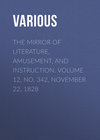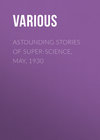Читать книгу: «The Mirror of Literature, Amusement, and Instruction. Volume 12, No. 342, November 22, 1828», страница 3
I expressed my convictions in regard to the double dealing of men in office.
"O," said he, "as to that, every court in Europe well knows that I have made the discovery, and they are all in confederacy against me; lest by giving it to any one, I should make that country master of all the rest—the world, Sir," he exclaimed with great emotion, "is in my hands and my power."
Satisfied with this announcement of the discovery of the philosopher's stone, I now inquired about the sublime alkahest or universal solvent, and whether he had succeeded in deciphering the enigmatical descriptions of the ancient writers on that most curious topic.
"Certainly," he replied, "I succeeded in that several years ago."
"Then," I proceeded, "have you effected the other great desideratum, the fixing of mercury?"
"Than that process," said he, "there is nothing more easy; at the same time it is proper I should inform you, that there are a class of impostors, who mistaking the ancient writers, pretend it can be done by heat; but I can assure you, it can only be effected by water."
I then besought him to do me the favour, to show me some of his fixed mercury, having once seen some which had been fixed by cold.
This proposition, however, he declined, because he said he had refused others. "That you may, however, be satisfied that I have made great discoveries, here is a bottle of oil, which I have purified, and rendered as transparent as spring water. I was offered £10,000. for this discovery; but I am so neglected, and so conspired against, that I am determined it and all my other discoveries shall die with me."
I now inquired, whether he had been alarmed by the ignorance of the people in the country, so as to shut himself up in so unusual a manner.
"No," he replied, "not on their account wholly. They are ignorant and insolent enough; but it was to protect myself against the governments of Europe, who are determined to get possession of my secret by force. I have been," he exclaimed, "twice fired at in one day through that window, and three times attempted to be poisoned. They believed I had written a book containing my secrets, and to get possession of this book has been their object. To baffle them, I burnt all that I had ever written, and I have so guarded the windows with spring-guns, and have such a collection of combustibles in the range of bottles which stand at your elbow, that I could destroy a whole regiment of soldiers if sent against me." He then related, that as a further protection he lived entirely in that room, and permitted no one to come into the house; while he had locked up every room except that with patent padlocks, and sealed the key-holes.
It would be tedious and impossible to follow Mr. Kellerman through a conversation of two or three hours, in which he enlarged upon the merits of the ancient alchemists, and on the blunders and impertinent assumptions of the modern chemists, with whose writings and names it is fair to acknowledge he seemed well acquainted. He quoted the authorities of Roger and Lord Bacon, Paracelsus, Boyle, Boerhaave, Woolfe, and others, to justify his pursuits. As to the term philosopher's stone, he alleged that it was a mere figure, to deceive the vulgar. He appeared also to give full credit to the silly story about Dee's assistant, Kelly, finding some of the powder of projection in the tomb of Roger Bacon at Glastonbury, by means of which, as was said, Kelly for a length of time supported himself in princely splendour.
I inquired whether he had discovered the blacker than black of Apollonius Tyaneus; and this, he assured me, he had effected; it was itself the powder of projection for producing gold.
Amidst all this delusion and illusion on these subjects, Mr. Kellerman behaved in other respects with great propriety and politeness; and having unlocked the door, he took me to the doors of some of the other rooms, to show me how safely they were padlocked; and on taking leave, directed me in my course towards Bedford.
In a few minutes, I overtook a man, and on inquiring what the people thought of Mr. Kellerman, he told me that he had lived with him for seven years; that he was one of eight assistants whom he kept for the purpose of superintending his crucibles, two at a time relieving each other every six hours; that he had exposed some preparations to intense heat for many months at a time, but that all except one crucible had burst, and that he called on him to observe, that it contained the true "blacker than black." The man protested, however, that no gold had ever been made, and that no mercury had ever been fixed; for he was quite sure, that if he had made any discovery, he could not have concealed it from the assistants; while, on the contrary, they witnessed his severe disappointments, at the termination of his most elaborate experiments.
On my telling the man that I had been in his room, he seemed much astonished at my boldness; for he assured me, that he carried a loaded pistol in every one of his six waistcoat pockets. I learnt also from this man, that he has or had considerable property in Jamaica; that he has lived in the premises at Lilley about twenty-three years, and during fourteen of them pursued his alchemical researches with unremitting ardour; but for the last few years shut himself up as a close prisoner, and lived in the manner I have described.
Here lyeth wrapt in clay,
The body of William Wray:
I have no more to say.
Weever's Epitaphs.
Notes of a Reader
COURT OF CHARLES II
In the last No. of the Edinburgh Review, there is an admirably written article on Hallam's "Constitutional History," not a mere essay, but somewhat more like a review than usual. It contains an abundance of florid, bold, and vigorous writing, extending through upwards of 70 pages. Among the most striking passages we notice a parallel between Cromwell and Napoleon, drawn with considerable force. But our extract is from the lighter portion, as the following ludicrous sketches of some of the enormities of Charles II. "Towards the close of the Protectorate, many signs indicated that a time of license was at hand. But the restoration of Charles II rendered the change wonderfully rapid and violent. A deep and general taint infected the morals of the most influential classes, and spread itself through every province of letters. Poetry inflamed the passions; philosophy undermined the principles; divinity itself, inculcating an abject reverence for the court, gave additional effect to its licentious example. … The favourite duchess stamps about Whitehall, cursing and swearing. The ministers employ their time at the council board in making mouths at each other, and taking off each other's gestures for the amusement of the king. The peers at a conference begin to pommel each other, and to tear collars and periwigs. A speaker in the House of Commons gives offence to the court. He is way-laid by a gang of bullies, and his nose is cut to the bone. … The second generation of the statesmen of this reign, were worthy of the schools in which they had been trained, of the gaming table of Grammont, and the tiring room of Nell –." This is but a small portion of the good set terms in which the reviewer illustrates the licentiousness of the times. Speaking of Clarendon, he says, "Mr. Hallam scarcely makes sufficient allowance for the wear and tear which honesty almost necessarily sustains in the friction of political life, and which in times so rough as those through which Clarendon passed, must be very considerable. When these are fairly estimated, we think that his integrity may be allowed to pass muster." Perhaps political honesty is like Joseph Surface's French plate, or the tinsel spread over a pair of Birmingham saleshop candlesticks, whose tenderness will not withstand the wear and tear of conveyance in the purchaser's pocket. But the oddity of the reviewer's comparisons even puts one in good humour with their virulence.
STREET SYMPATHIES
During "the season" the veriest stranger who has an eye and ear, and thoughts, must find in London sufficient to occupy his attention; true, he may start and sigh, to think that of the busy and enormous multitude around him, not one would care, if, treading on yonder bit of orange peel, he should slip off the flagway, and falling beneath the wheel of that immense coal-wagon, have his thigh crushed to atoms, while you'd be saying "Jack Robinson." But if he do sigh, the more fool he; first, because "grieving's a folly," as the old sea song hath it; next because he is mistaken in supposing that no one would feel interested in his misfortune. There are two upon the very flagway with him, who would evince the greatest sympathy in his fate; the one is a surgeon's apprentice, who, with anxious care, would bear him off to his hospital, that he might "try his 'prentice hand" to doctor him while living, and dissect him when dead; and the other is a running reporter to one of the morning papers, who would with gentle and soothing accents inquire his name, condition, and abode, to swell the paragraph, and increase his pay.—Blackwood's Magazine.
Покупайте книги и получайте бонусы в Литрес, Читай-городе и Буквоеде.
Участвовать в бонусной программе




















